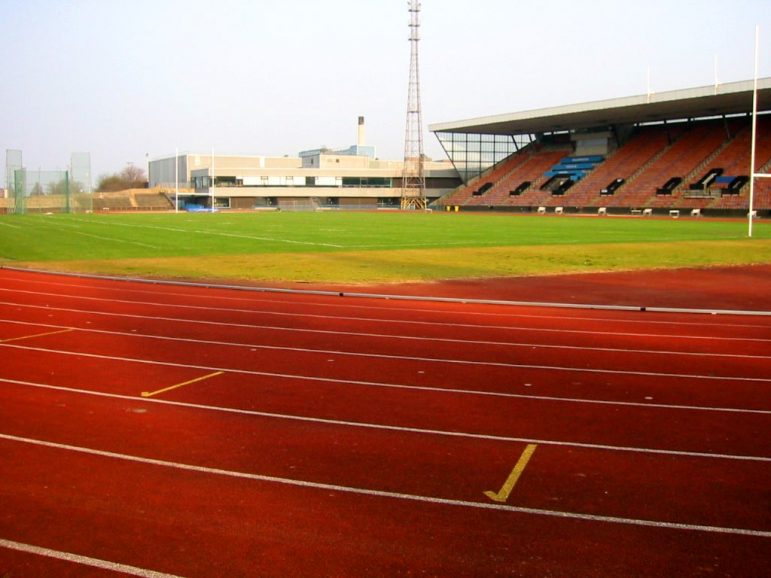Two of Evans’s San Jose State University teammates, Tommy Smith and John Carlos, protested first, and most famously, bowing their heads on the medal stand and raising their fists in black gloves after place first and third in the 200 meters. The U.S. Olympic Committee sent them home immediately and banned them from future competitions. It also warned other athletes, including Evans, against making a public display.
When Evans and his 400 meter colleagues took to the medal stand, they wore revolutionary style black berets, but took them off during the national anthem. Their gesture was too militant for many Americans, but not strong enough for many supporters in San Jose. Bronze medalist Ron Freeman remembers the homecoming.
“We did not go through what Lee went through. I came home and had a ticker tape parade, had a day at the football stadium. I think that when Lee came home, he came back to San Jose State as an Olympian and Tommie and John came back to San Jose State as an Olympian, but in a different level, because of the stand they took.”
But Evans also came home with the kind of credentials — two world records — that can make young athletes sit up and pay attention. He took those credentials on the road, teaching and coaching all over the world, from California to Nigeria, Saudi Arabia, Qatar, Kenya and Cameroon.
These days he makes a home in Mobile, Alabama, where he coaches the University of South Alabama’s track team. As a new recruit in 2002, U-S-A runner Jeremiah Carter, from Semmes, just outside Mobile, was not initially aware of his coach’s past accomplishments.
“I never heard anything about Coach Evans before, really, so, when we first talked to him I figured he’s a regular, you know, good coach, and it wasn’t later until I found out what was going on. I was like, wow! You know, I got me in a position where I could have a good coach who’s got a couple gold medals under his belt.”
“Course I remember Lee running the 400 meters and coming home, charging real strong.”
Three time Olympic medalist Harvey Glance was a ten-year old in Phenix City when Lee Evans and the other stars of ’68 inspired him to new heights. Glance is now the head track coach for the Crimson Tide.
“It showed a lot of his charater and he still carries that today. I mean, he’s a warrior. He’ll fight to the bitter end. And that will always be Lee Evan’s trademark, is that, you know, he’ll never give up.”
(Evans)”The hardships I went through, growing up as a young man in America, around people that didn’t, was not the same color as me. It just happened, you know, we lived in a rural area and we was the only blacks around. My life, to me, was grim, growing up, you know. Even though it was a lot of hard work, you know, farm labor work involved, but you know, when I turned nineteen, you know, I, it’s like I was free. You know. I was a freshman in college. I was number one in the world in the 400 meters. It’s a big difference, you know. I was in Brussels, Belgium going to a track meet, or London or Paris. You know, it was a big difference, from the cotton field to Paris, right?
Evans tries to impart his fighting spirit to his athletes, but he sometimes worries that today’s athletes lack some of the drive that he and his colleagues had years ago.
“My high school career, my university career, I never missed one day of training. If I missed training, I would be, it’s like I lost something, you know? It’s like, wow, I missed a whole day of preparation, many, I’m not going to be as good as I could have been if I hadn’t missed this training!”
Evans still welcomes a good fight, and before the NCAA Regional Meet this spring in Baton Rouge, Coach Evans and Assistant Coach Ron Davis talked about the challenges of recruiting against powerhouses like the meet’s host, L.S.U.
“See, we’re always watching our budget,” says Davis. “They don’t have to watch their budget. Look! That’s their weight room, right there. Music. Top notch weights. And indoors, inside there, they have an equipment room. They just go in there. There’s a roomful of equipment with Nike is their sponsor.”
“All we can do is take them to the Red Lobster and beg them, you know!” jokes Evans.
But Coach Evans and Coach Davis can afford to laugh. Because they have a recruiting network that no other school can boast of the fruit of more than forty years of combined coaching experience in Africa and the Middle East, where they helped scores of athletes to navigate the college admissions and student visa processes in the U.S., earning academic degrees while training to be starts for their own national Olympic teams.
Ajoke Odumosu of Nigeria, now a South Alabama sophomore, recalls a recruitment process that never even got to the Red Lobster phase. It was strictly email.
“Some of his history was now mailed to me, in my box. So I read about him, that he’s an Olympic medalist, world record for twenty years. I was like, oh, this is great. And he’s like, world record in the 400 meters. I said, oooohhh, that is my event!”
As a freshman, Odumosu surprised everyone but her coaches by finishing second in the 400 meter hurdles at the NCAA regional meet to Alabama’s Beau Walker. On a team with athletes from as close as Satsuma, Alabama and from as far as Gulu, Uganda, Odumosu has reason to be excited about the team’s future, under the guiding eye of her world class and globe traveling coach, Lee Evans.

